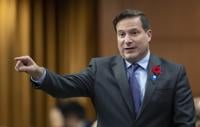REGINA - The Saskatchewan government says it will fight a court ruling over its school pronoun law, calling it a potential game-changing precedent when it comes to provinces' use of Charter's notwithstanding clause.
"We remain committed to using all tools necessary to protect parental rights, including requesting a stay of this decision and an appeal all the way to the Supreme Court of Canada," Saskatchewan Justice Minister Bronwyn Eyre said Friday.
Eyre said she plans to write to other attorneys general across the country over the potential precedent.
"This is a historic decision for şÚÁĎłÔąĎÍř jurisprudence, as no Superior Court in Canada has ever decided that it may issue a declaration respecting an alleged Charter breach, in the face of a validly invoked notwithstanding clause.
"The importance of this decision for all provincial legislatures cannot be overstated."
Eyre was responding to a decision Justice Michael Megaw delivered earlier Friday in a challenge to a Saskatchewan law requiring parental consent for children under 16 who want to change their names or pronouns at school.
Premier Scott Moe's government used the notwithstanding clause in the Charter of Rights and Freedoms to pass the law last year and says as such, the law is not violating the Charter.
But UR Pride, an LGBTQ group in Regina, has asked to still be allowed to challenge the law under the Charter, and on Friday Megaw said they should get the chance.
"UR Pride has recognized the claim here is in somewhat uncharted territory," Megaw said in his written decision.
"However, that UR Pride has a steep hill to climb in this regard does not mean it should not be given the opportunity to engage in the climb in an effort to illustrate that the incline can be conquered.”
Megaw's decision allows UR Pride and the government to present all their evidence and arguments in court. The judge can then decide his next steps.
Lawyers for UR Pride urged Megaw last month to allow the challenge, arguing the law passed by Premier Scott Moe's government limits the rights of gender-diverse youth who are entitled to a safe educational environment.
Lawyers for the government urged the judge to dismiss the challenge on the grounds the law doesn’t breach the Charter and is in the best interest of gender-diverse children.
The notwithstanding clause is a rarely used measure that lets governments override certain Charter rights for five years.
Megaw said for now he’s declining to consider the government's bid to have case deemed moot.
“A difficult claim, a novel claim or even a steep climb claim is not analogous to a doomed claim,” Megaw wrote.
“There is no basis here to deny the applicant the opportunity to establish their claim.”
Bennett Jensen, one of UR Pride's lawyers, said he's eager to get back to court.
"The quicker we can move forward and be able to make arguments about how the legislation violates the constitutional rights of those students, the sooner, hopefully, the law can be struck down and students can be supported in their individual circumstances," Jensen said.
He added it's disappointing Saskatchewan is prepared to take the law to the Supreme Court.
"The government was suggesting that the use of the notwithstanding clause puts an end to this litigation, and I think it's very reassuring that from a basic constitutional democracy perspective, that the legislature cannot supplant the role of courts.
"The courts still have a critical function and are part of the government apparatus."
Opposition NDP Leader Carla Beck said in a statement the province should repeal the law and focus on what matters.
"Instead of continuing to waste public dollars and resources fighting this case in the courts and trampling on the rights of vulnerable kids, the (Saskatchewan) Party should make the investments needed in kids’ classrooms right now."
The challenge is scheduled to be back in court on Feb. 26.
Saskatchewan is not the only province remaking policy in this area.
Last year, New Brunswick brought in rules that require students 16 and younger to have parental permission to change their names or pronouns at school.
Last month, Alberta Premier Danielle Smith said parental consent would be required for students 15 and under who want to change their names or pronouns at school. Students who are 16 and 17 would not need consent, but their parents would have to be notified.
Alberta has also announced plans to restrict gender affirmation treatments for teens, instruction on gender and sexuality in school, and the ways in which transgender women can participate in sports.
Smith said the changes are to protect children from the consequences of choices they may later regret and to preserve the role of parents in their lives. She has not ruled out using the notwithstanding clause.
Alberta Opposition NDP Leader Rachel Notley said much of the legal opinion on the issue suggests transgender policies are offside with şÚÁĎłÔąĎÍř laws.
"The notwithstanding clause was designed to be a release valve for when the Charter might come up against the democratic wishes of the majority of the population," she told reporters Friday.
"That's not what this is. What this is, is a government bullying less than one per cent of the population in a way that does not enjoy the support of anywhere near the majority of the population."
This report by şÚÁĎłÔąĎÍř was first published Feb. 16, 2024.








































